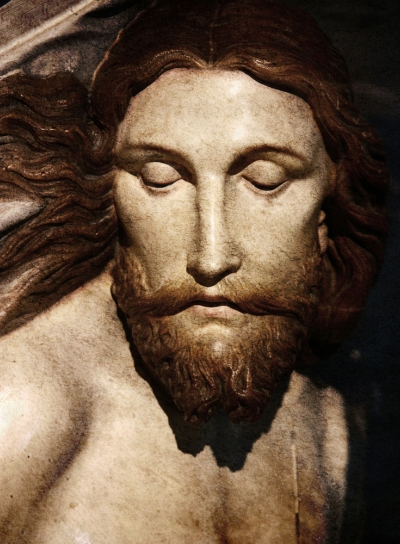On What Was Devine in Jesus (and in us)

The language of faith is mytho-poetic, not literal. It describes the meaning of reality, not the facts. Thus the contemporary question of whether Jesus was factually born of a virgin or was the biological son of God confuses the very intention of the ancient authors.
For a person of that time and culture to claim Jesus was born of a virgin and the spirit of God ‘means’ that there was something about him that was sacred: e.g., his love, justice, peace, and compassion, which are the primary character traits of God. In other words, he had truth living in him — truth not as factual, but truth as meaningful, purposeful, and life-giving.
And to claim he was the “son of God” was a common euphemism in ancient Hebrew culture, attributed to other prophets and leaders as well, that meant that one was designated with a sacred purpose and possessed the same virtues and values (e.g., love, peace, compassion, justice, etc.) as God. Hence, it was his “way” of life that was sacred, not his very being.
Jesus, by the way, said we could be like him, follow in his ways, live by the compassion of God, and even do greater things than him. He did not consider himself to have a different metaphysical nature than us, but the same.
His uniqueness is that he chose to trust in and live by God’s values, whereas most of us fear doing the same. He trusted more in having a compassionate character than he did in desiring his own longevity, safety, success, comfort, and economic and material welfare. He would rather die by being tortured by his enemies than to live by values in which he himself would be willing to do violence to another. This indomitable commitment to God’s value system, more than his love of life itself, was what was sacred about him.
He believed we could share in this same sacredness if we, too, would unequivocally follow the Great Commandment and the Golden Rule — i.e., the summation of God’s, and his own, values (which if we inculcate them in our own character “saves” and “gives life” to our spirits). He asked us to follow in his ways; not treat him as a God (for whom we’d never be able to emulate).
Thus the sacred in him was not his inborn essence (or at least no more than we all have the image/character of God within us), but rather his self-chosen values and cultivated virtues he developed over the years. He was not literally born different; but that notion in ancient times was more of a suggestion of one whom we should follow because of his developed Godlike Spirit/character (not his essence).
It is living by this sacredness that is our salvation. Salvation comes from Jesus not because he did it for us, but because we adopt his own Spirit/character which transforms our own spirits — not so that we live forever, by the way, but so that we live vitally/eternally/meaningfully/purposefully/significantly/fulfillingly in the here and now.
Thus our faith is not to be in the person who was Jesus, but instead (as he directly told us) in his way. It is little wonder that he and his disciples thought about it as such since they were not called “Jesusites” or even “Christians,” but people of “The Way.”
If we interpret the Bible through the mytho-poetic lens of the virtues and values it prescribes us to follow, and not the facts, historical accuracy, or scientifically provable elements by which today we so narrow-mindedly distort the intentions of the Biblical writers, we will discover the truths that set us free from the bondage of facticity and literalism…from the prison of thinking we are unworthy or less than sacred…and the “hell” of assuming there must always be a great chasm between the Spirit or character of God and our own.
If Jesus was special in any way from you and I, it was that he trusted in the sacredness of each and every one of us, and sought to empower us to go and do as God would have us to do — believing with his heart and soul that we could do it; just like him.
This, in my estimation, is a far greater gift to humanity than the disempowering notion that we needed a savior to atone for our sins and save us from our own wretchedness. As people of sacred worth, we are responsible for our own decisions, spiritual integrity, and moral/ethical development. We are not helpless, but co-creators with God of our very souls. The birthright of us, like Jesus, is to go and truly be the children of God — those who seek, nurture, cultivate, and sustain the virtues and values of sacredness in our own lives.
— Rev. Bret S. Myers, 4/9/2019
